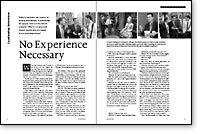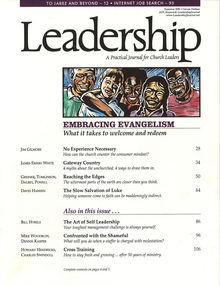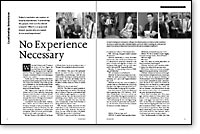
When Jim Gilmore took 75 pastors on a tour of Las Vegas, he pointed them beyond the gambling, showgirls, and Siegfried and Roy. They saw Vegas as “an experience.” Gilmore introduced them to the strategies used to wow visitors.
It’s all part of what Gilmore and fellow economist and business partner Joe Pine call The Experience Economy. Their book by that title (published by Harvard Business School Press) is capturing the attention and imagination of the marketplace.
Well, Vegas is one thing, but what about where we live? How does the Experience Economy affect churches in ordinary places? We asked Gilmore to wander with us through downtown Chicago and comment on the “experience-seeking culture.”
Leadership editors Marshall Shelley, Kevin Miller, and Eric Reed walked with Gilmore through streets and shops, and asked Gilmore, a devout Christian, how all this informs our approach to worship and evangelism. What we found—and his application of it all—really surprised us.
We met Gilmore in the lobby of the House of Blues Hotel, his favorite place to stay in Chicago. He immediately showed us a card.
Jim Gilmore: This was in the nightstand beside my bed. It’s their version of the Gideon Bible, a card that says, “Call the front desk to order the religious reading material of your choice.” And you can choose from the Bible, the Koran, the writings of Confucius, Buddha, the Dalai Lama, or a book of voodoo spells.
KM: So why do you stay here?
Gilmore: This hotel is a good example of what’s happening in our society. The melting pot of values in America is represented here in the lobby, brought together in a way that creates a sense that one has experienced something unique. People want to take a bit of it home to remember their stay, and they want to come back to see what the hotel is doing differently the next time.
MS: The jazz, Gospel, and even African tribal decor we can understand, and the artwork by B.B. King, certainly, but the first thing you see inside the door is Buddha! What’s that have to do with the blues?
Gilmore: It says we all have the blues, everybody can relate to what happens here.
MS: Suffering, the great human common denominator.
Gilmore: Esthetically, it works. It’s Indian and African, New Orleans and Persian, but it’s harmonized. Disparate elements from many cultures work together to create a unified space. Most people who visit won’t see a conflict between B.B. King and Buddha.
Besides, it’s fascinating to have a 2,600-year-old doorman.
ER: Let’s head over to Starbuck’s.
Gilmore: So this is a peripatetic interview.
MS: Yes, teach us as we go. The Experience Economy isn’t just a Las Vegas phenomenon, is it?
Gilmore: On my tour with the pastors, I wanted them to understand that everything they see in Las Vegas is coming to their town. And the mindset is entering their churches.
Just look around. There are dozens of clear examples here: FAO Schwarz, ESPN Zone, DisneyQuest. Any town with an upscale coffee shop has a good example of a staged experience. And there’s the Internet, which is becoming the new Las Vegas, bringing the world of experiences and interactivity into the home. Experiences have become the basis of everyday commerce.
* * *
Waiter: What can I get you?
Gilmore: A mocha frappe grande, please.
KM: Decaf, and something to eat with it.
Waiter: We have cranberry-raisin bagels, cinnamon-orange scones, almond biscotti.
KM: Um, bagel.
MS: Latte.
KM: How does this coffee shop show us that the economy has changed?
Gilmore: Starbuck’s isn’t just about coffee. It’s about the coffee-drinking experience.
MS: So how did we arrive at an economy based on buying and selling “experiences”?
Gilmore: Commerce has moved through three economic phases and is now entering a fourth. First was the Agrarian Economy in which economic value was based on the ability to extract commodities—grain, minerals—from the earth. Next came the Industrial Economy built on the ability to make goods from those commodities. Next came the Service Economy: providers perform various services for clients. Now we’ve entered a new era, the Experience Economy.
Think about a birthday cake. Fifty years ago, mothers made birthday cakes from scratch. A few commodities—flour, butter, sugar, and eggs—cost less than a dollar. Next, as the Industrial Economy advanced, moms used packaged goods (cake mix) and paid a couple of dollars to Betty Crocker for the pre-mixed ingredients. Then came the bakery-made cake, a service many thought well worth the $15 it cost, because time is worth more than money to many people.
Now the homemade birthday cake has been replaced by the birthday experience. Chuck E. Cheese or Jeepers stages a memorable birthday event. You are witnessing the Experience Economy at work.
KM: But home birthday parties always included pin the tail on the donkey. Isn’t that an experience?
Gilmore: Yes, we’ve always had experiences, but we didn’t pay someone else to provide them. That’s what’s changed.
KM: I took my family out to an orchard an hour west of here to pick apples. I could have bought that same bag of apples for two bucks.
Gilmore: Excellent example.
KM: By the time we bought the cider, walked through the gift shop and bought the apple cake and apple donuts along with our bushel of apples, I had spent like sixty bucks. But I wasn’t buying apples, I was buying the sense of harvest, of the country.
Gilmore: These types of experiences have become the basis of economic activity. We willingly pay to experience things people once did for themselves. At the same time, our expectations about what we get for our money have risen, and with them the lengths to which experience providers must go to satisfy their customers. They must constantly refresh the experiences offered.
ER: All of life is an experience. What makes some experiences marketable?
Gilmore: We’ve identified five principles that go into designing a compelling experience: First, a well-defined theme. A poorly conceived theme gives customers nothing around which to organize their impressions, and the experience won’t be a memorable one. An effective theme has a unified story line. It captivates the customer.
Second, harmonize impressions with positive cues. Everything in the House of Blues lobby worked well together. It reinforced the experience. And with positive cues, you tell the customer that he is important and that the experience will be worthwhile.
Third, eliminate negative cues, anything that intrudes on the customer’s enjoyment.
Fourth, mix in memorabilia. If the experience is worth remembering, then the customer will want to take a bit of it home.
Fifth, engage all five senses, as long as the sensations are good ones and reinforce the experience.
A place here in Chicago does it as well as anyone: American Girl Place.
KM: Let’s go!
* * *
Gilmore: Joe and I named this the “Experience Stager of the Year” two years ago.
The number one question people ask me when they come here is “Where’s the store?” It doesn’t look like a store, and you can’t find a gift shop. The whole place is the offering, but they’ve broken the “store” paradigm.
Inside the front door we have the concierge desk. Here you can buy tickets to the American Girl Revue or make arrangements to eat at the cafe, which is upstairs with the photo studio and the doll beauty salon. There’s also a library and a gallery. Each of the seven dolls is cast in an historic era, has her own nationality or ethnicity and a whole collection of books and accessories.
KM: This has a museum feel.
Gilmore: Very much. It’s not cluttered with merchandise. Everything is showcased.
KM: My daughter has a lot of this stuff—the dolls, the accessories, the toy wheelchair.
ER: But all of this is for sale.
Gilmore: Notice the cards. Each pictures a different accessory. You can take the card to the counter and a clerk will bring you the item. Or, you can just collect the cards—part memorabilia, part aspiration.
KM: A wish list. Give this to Grandma so she’ll know what to get you.
Gilmore: Aspects of the experience are designed to be cross-generational. Table talk cards at lunch encourage children and parents to share their feelings: “Have you ever been homesick?” Girls bring their dolls and seat them in high chairs that attach to the table. We’re here in time for the first seating for lunch.
MS: And if there are five men in here, I would be surprised.
Gilmore: We have. … two fathers there, and maybe that’s a grandfather. A work associate of mine brought his two nieces here and spent $400. Lunch is $16 per person. You can have your doll’s hair styled, get your photo on the cover of an American Girl magazine, go to the theater. For a group of four, you could easily spend a couple hundred dollars before you’ve bought a single physical thing. People are buying experiences.
MS: So how does all this “experience providing” apply to the church?
Gilmore: It doesn’t. When the church gets into the business of staging experiences, that quickly becomes idolatry.
MS: I’m stunned. So you don’t encourage churches to use your elements of marketable experiences to create attractive experiences for their attenders?
Gilmore: No. Christians can use the principles in the book to succeed in the marketplace, but the organized church itself should never try to stage a God experience.
KM: When people come to church, don’t they expect an experience of some kind? Consumers approach the worship service with same mindset as they do a purchase.
Gilmore: Increasingly you find people talking about the worship experience rather than the worship service. That reflects what’s happening in the outside world. I’m dismayed to see churches abandon the means of grace that God ordains simply to conform to the patterns of the world.
KM: So what happens in church? Are people getting a service, because they’re helped to do something they couldn’t do on their own, that is, get closer to God? Or are they getting an experience, the encounter with God through worship?
Gilmore: The word getting is, I think, the problem with contemporary Christianity. God is the audience of worship. What you get is, quite frankly, irrelevant as a starting point.
ER: But people, especially unchurched people, don’t perceive it that way. They’re expecting some return.
Gilmore: They may come that way at first: “Give me, feed me, make me feel good.” But they should be led to say, “Hey, this is not about me, God. Worship is to glorify You.”
KM: That’s a lot to expect from an unchurched person or a new Christian. If my mission is to reach a consumerist culture—if I’m going to get a hearing for my message—then I’m going to have to provide something that the consumer considers of value.
Gilmore: That is the argument. But the only thing of value the church has to offer is the gospel. I believe that one result of the emerging Experience Economy will be a longing for authenticity. To the extent that the church stages worldly experiences, it will lose its effectiveness.
ER: So people simply need an authentic experience of God.
Gilmore: That’s how I see it. My business partner and I are writing for business. We use business words. In our next book, we plan to address some sacred words, dogmas. The new dogma we think is emerging is authenticity.
I would say that the only act of human kind that’s truly authentic is true worship. Everything else is just—
MS: religious simulation.
Gilmore: I once had a Catholic friend visit me for the weekend. On Sunday, I asked if he wanted to go to church with me. It was a new church, just starting. We were meeting in a gym with folding chairs.
He agreed to go, and frankly, I was kind of embarrassed. You know—the gym, the clanky piano, certainly no impressive music or drama.
Afterward I said, “Sam, I apologize for the service today.”
“Apologize?” he said. “No. It was wonderful.”
I was stunned. “How so?”
“The fact that all of you wanted to be gathered for that spoke to me.”
MS: What comes after the Experience Economy? Will people ever tire of seeking new sensations?
Gilmore: After a while, thoughtful people begin to ask, “What effect are all these experiences having on me? What am I becoming?” That’s why we think that the Experience Economy will eventually give way to the Transformation Economy.
When the marketplace is filled with experiences, then people will begin to pay for demonstrated outcomes. Then you’re in the transformation business, but eliciting transformations is the most intellectually demanding; sometimes it involves great physical and emotional demands as well.
KM: And spiritual.
Gilmore: Yes, but in the church, it’s God who’s doing the transforming. But, look, I’m not a pastor; I’m an economist. Pastors may see applications from our book that we didn’t intend. But I don’t want pastors to use our book as a manual for changing their churches.
It’s more having a heart for the people in the world and understanding the world we’re trying to reach. I hope they come away with a better appreciation for how the marketplace can never compete with the free gift found only in Christ.
MS: Well, thanks for the tour. We’re headed to the ESPN Zone for lunch.
Gilmore: Great place. Restaurant, sports entertainment, art gallery, and gaming arcade all rolled into one. Certainly a great experience.
Copyright © 2001 by the author or Christianity Today/Leadership journal.Click here for reprint information on Leadership.










